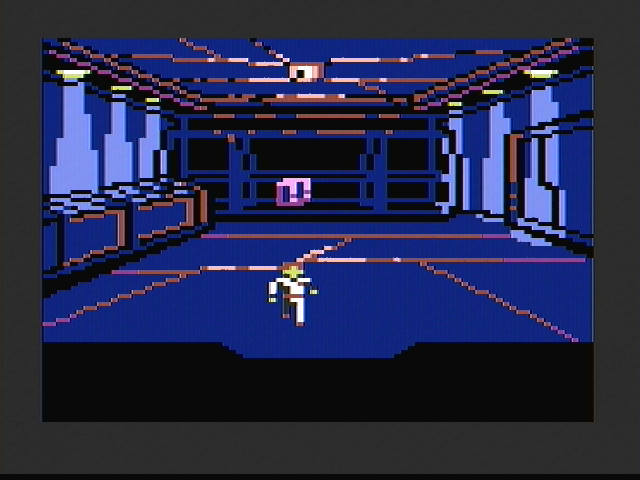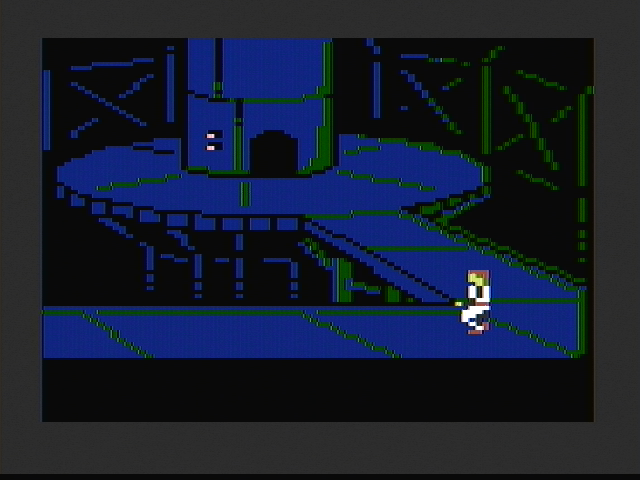PAGE (Propeller Adventure Game Engine) Project
What is PAGE?


PAGE (Propeller Adventure Game Engine) is an adventure game engine similar to the vintage PC-based adventure game engines such as Sierra's AGI (Adventure Game Interpreter) and SCUM (Script Creation Utility for Maniac Mansion) for the Parallax Propeller microcontroller. The PAGE interpreter engine generates composite NTSC video output, plays MIDI sound, and runs an interpreted code, PINT, that is compiled specifically for the PAGE interpreter.
In order to provide suitable game interaction and to minimize the resource requirements, the PAGE interpreter "reads" (using the fsrw object) the room object files from an SD card, and only persists global resources needed to maintain the game structure.
Gameplay under the PAGE interpreter is a hybrid of the SCUMM engine (using specific, pre-set actions), and some of the early Sierra AGI games (simple character animation and objects that can be "take"en, "look"ed at, or "use"d). It lacks some of their complexity (managing multiple "layers" of visible elements onscreen).
Contrbuters:
trodoss, roadster, JTCook
Special Thanks To:
roadster, JTCook, Oldbitcollector (Jeff), Cardboardguru, Potatohead, Ariba, Baggers, lft, Unsoundcode, Chris Savage
Platform Requirements:
- Propeller board with NTSC video out (using Demo Board or Hydra pin configuration)
- SD card capability
- Keyboard or NES Gamepad
Supported Platforms:
- Propeller Platform USB + El Jugador Module
- Hydra Console (support added by roadster)
- C3 (support added by roadster)
* You will need to change the commeted code in th PAGE_Main.spin file to match your system configuration
Project Source Code/Examples:
You will find the most up-to-date code here, or by viewing the project site:
http://code.google.com/p/trodoss-prop/
The current version at the time of posting has been attached to this post and is available for download.
Tools/Applications:
In the distribution are included tools specific to the PAGE project.
PINTCompiler.exe - This application compiles the PINTBasic code that is used by the PAGE interpreter to make the sample games. PINTBasic is a very simple BASIC language used to script the creation of the game and it's resources. The full description of PINTBasic, and it's syntax, is available in the PAGE disribution.
PINTRoomViewer.exe - This application allows the viewing of the "room" resources that are used by the PAGE interpreter.
As noted in the code, the project is released under the MIT License. You can review the specifics in the comment in the code, or by reviewing the license on the project site.
Version 0.5 includes the "Spaced Up" demo game, example code, and documentation.
Compilation:
Propeller source code can be compiled in either the Propeller Tool or in BST.
Tools source code is written in C#, and are both command-line and GUI based applications (source included) compiled under .NET framework 2.0 (v2.0.50727). If you have the Mono runtime installed on Linux, you should be able to run these as well. Compiled binaries for the Windows environment are included in the archives.


PAGE (Propeller Adventure Game Engine) is an adventure game engine similar to the vintage PC-based adventure game engines such as Sierra's AGI (Adventure Game Interpreter) and SCUM (Script Creation Utility for Maniac Mansion) for the Parallax Propeller microcontroller. The PAGE interpreter engine generates composite NTSC video output, plays MIDI sound, and runs an interpreted code, PINT, that is compiled specifically for the PAGE interpreter.
In order to provide suitable game interaction and to minimize the resource requirements, the PAGE interpreter "reads" (using the fsrw object) the room object files from an SD card, and only persists global resources needed to maintain the game structure.
Gameplay under the PAGE interpreter is a hybrid of the SCUMM engine (using specific, pre-set actions), and some of the early Sierra AGI games (simple character animation and objects that can be "take"en, "look"ed at, or "use"d). It lacks some of their complexity (managing multiple "layers" of visible elements onscreen).
Contrbuters:
trodoss, roadster, JTCook
Special Thanks To:
roadster, JTCook, Oldbitcollector (Jeff), Cardboardguru, Potatohead, Ariba, Baggers, lft, Unsoundcode, Chris Savage
Platform Requirements:
- Propeller board with NTSC video out (using Demo Board or Hydra pin configuration)
- SD card capability
- Keyboard or NES Gamepad
Supported Platforms:
- Propeller Platform USB + El Jugador Module
- Hydra Console (support added by roadster)
- C3 (support added by roadster)
* You will need to change the commeted code in th PAGE_Main.spin file to match your system configuration
Project Source Code/Examples:
You will find the most up-to-date code here, or by viewing the project site:
http://code.google.com/p/trodoss-prop/
The current version at the time of posting has been attached to this post and is available for download.
Tools/Applications:
In the distribution are included tools specific to the PAGE project.
PINTCompiler.exe - This application compiles the PINTBasic code that is used by the PAGE interpreter to make the sample games. PINTBasic is a very simple BASIC language used to script the creation of the game and it's resources. The full description of PINTBasic, and it's syntax, is available in the PAGE disribution.
PINTRoomViewer.exe - This application allows the viewing of the "room" resources that are used by the PAGE interpreter.
As noted in the code, the project is released under the MIT License. You can review the specifics in the comment in the code, or by reviewing the license on the project site.
Version 0.5 includes the "Spaced Up" demo game, example code, and documentation.
Compilation:
Propeller source code can be compiled in either the Propeller Tool or in BST.
Tools source code is written in C#, and are both command-line and GUI based applications (source included) compiled under .NET framework 2.0 (v2.0.50727). If you have the Mono runtime installed on Linux, you should be able to run these as well. Compiled binaries for the Windows environment are included in the archives.


